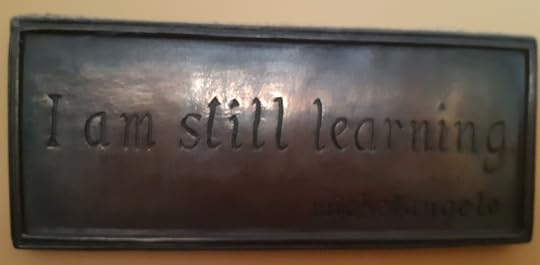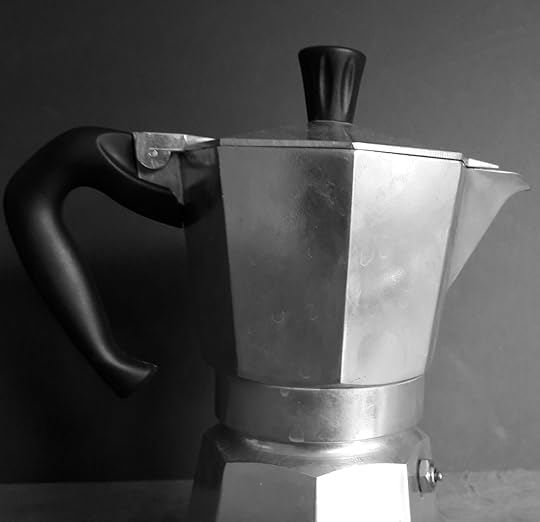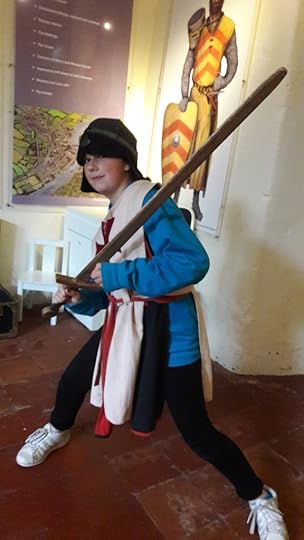Grace Tierney's Blog, page 13
June 12, 2023
Bringing Forth the History of the Word Education
Hello,
It’s exam season here in Ireland. It’s a commonly held belief (sadly not really supported by the evidence) that exam season brings us sunny, dry days. That has been the case for the last two weeks but 18 year olds are sitting their mathematics (paper 2) and Irish language (paper 1) today and it is currently raining. Thankfully neither of my offspring are sitting those state exams today. One survived the experience last year and the other has it looming over them for next year. My best wishes go to this year’s students and parents.
Taking seven exams to prove you learned something during six years of secondary level education is a scary concept to even the best student. University places are assigned purely (with exceptions for art portfolios and medicine aptitude tests) based on the results. Media and social attention to the results is high and heaps pressure on the teens.
As a result education is on my mind. I read “The Pride of Miss Jean Brodie” by Muriel Spark last year for my book reading challenge (details here). Jean is a controversial teacher and she holds forth in the book about etymology which naturally caused me to bookmark the page.
“The word education comes from the root e from ex, out, and duco, I lead. It means a leading out. To me education is a leading out of what is already there in the pupil’s soul.”
I was curious to discover if Miss Jean Brodie was correct, as elsewhere in the novella we discover her knowledge is somewhat patchy.
 “I am still learning” Michelangelo
“I am still learning” MichelangeloThe verb to educate joined English in the mid 1400s as educaten (to bring up children, to train). It came from educatus and educare (bring up, educate) in Latin. This Latin source gives us cousin words in Italian, Spanish, and French. Miss Brodie’s explanation of ex and duco is correct. Duco comes from the Proto Indo European root word deuk (to lead). However the “Century Dictionary” (originally published in the late 1800s) states the idea that education is about leading forth the child’s ability is a leap too far. Sorry, Miss Brodie.
By the 1500s we had the word education (child rearing or the training of animals) which English took from the word in French (there since the 1300s). Again this went back to Latin roots. Originally in English education related to learning manners and social codes rather than mathematics and language skills. By the 1600s the word had gained the meaning of systematic schooling and training for work.
Ultimately the story of the word education tells us that schooling has adapted to its times through the centuries. The Romans saw it as training, perhaps to fit students for roles in the rigid structure of Roman society and army? The French adopted it for child rearing. The English focused on manners and later on training for work. We may like the idea of education being about bringing a child’s potential to full fruit but many forms of education today still focus on skills for the workforce.
What do you think? What form of education is best? For me, I’d have to echo Michelangelo – “I am still learning”.
Until next time, happy reading, writing, and wordfooling,
Grace (@Wordfoolery)
June 5, 2023
The Changing Meaning of Egregious
Hello,
This week’s word is egregious (pronunciation here), mostly because it’s a word I enjoy using, partly because it’s one of those fun words whose meaning has inverted since its creation, and finally because I stumbled on a fun etymology term and can’t resist plonking it into the blog via the story of egregious (you have been warned!).
Let’s start with the basics. What does egregious mean and where does it come from?
If you check a dictionary you will find two meanings listed. The primary one is of something being especially bad. For example – “The student failed his mathematics exams because it was littered with egregious basic miscalculations”. The second one may be marked as archaic – distinguished. There it is, egregious used to mean something was great but now it’s more likely to mean it is terrible – a total meaning inversion. You would think this is rare in the dictionary but actually it’s not. I keep meaning to do an entire article about these flip-flopping words.
Egregious joined English in the early 1500s with the meaning of distinguished or excellent as a direct borrowing from Latin (more on that later). Latin had the word egregius from the phrase ex grege (rising above the flock). Ex meaning out of (we see this in exit, for example) and grege (a variation of flock) which was drawn from the Proto Indo European root word ger (to gather). So if you stand out from the crowd, in a good sense, you’re egregious.
By the end of the 1500s the egregious positive sense had been joined by an ironic sense of being the opposite of excellent. Over time this negative version became the main one but you’ll find it used in the positive sense in novels from the 1950s, so be careful of context when you see this used in older works.
Now for the little etymology term. I was pottering around for egregious info and stumbled on a good post by Dave Wilton over at Word Origins. Dave explained that egregious is an inkhorn term and naturally I was intrigued by this idea because I hadn’t stumbled across it before. An inkhorn term is a word which was imported into English from Latin or Greek in the 1500 and 1600s. They were often used to show off that you had a classical education and “better” vocabulary than those around you. Sadly some people still like to flaunt “fancy words” in the same fashion today. Most inkhorn terms didn’t gain common use but egregious is one which did. I can only assume the inkhorn is a reference to a student needing to have a bottle of ink available for their studies.
Until next time, happy reading, writing, and wordfooling,
Grace (@Wordfoolery)
May 29, 2023
The Many Uses and History of Ditto
Hello,
Ditto is one of those English words you may not hear that often, and yet it is needed and used regularly. I remember being astounded when somebody explained to me at school that if I used two small parallel vertical lines below an item in a list that was a way to show the item was repeated. “That means ditto,” they said. “What’s ditto?” I replied.
What is ditto? Ditto is the same thing again, often indicated by the ditto mark (those little parallel lines, sometimes typed via the double quote mark on your keyboard) beneath the word or figure to be repeated. Ditto can also be used in speech or writing to indicate a repeated action. For example, “He crossed his legs, so did she. He folded his arms, ditto“.
Ditto has been with us for a long time in English and has old roots. It arrived in English in the early 1600s with thanks to Italian and Tuscan dialect in particular, but with links to Latin. In Latin there’s a verb dicere (to speak, tell, or say). In Italian that verb became dire (to say) which may seem very familiar to French speakers as dire is also used in that language. The verb dire in Italian is conjugated into detto. The Tuscans took a twist on it with ditto (in the said month or said year).
It was that twist which led Italians to use ditto to avoid repetition of month names when writing a series of dates. This shortcut was then adopted by the English, who traded widely with Italy at the time. By the late 1600s ditto was being used to mean “the same as above” for any item, not only dates.
By the late 1700s you might also find the word dittoes being used for a suit of men’s clothes of the same colour and fabric. This use persisted at least to the early 1800s.
A similar but unrelated word is dittography. This is defined as “the unintentional repetition of letters or words in copying or printing”. For example, writing tabble instead of table. I expected it to share roots with ditto, but apparently not according to several dictionary sources. It’s imported to English from Greek dittos (double) and graphia (writing) – literally the idea of writing something twice.
Until next time, happy reading, writing, and wordfooling,
Grace (@Wordfoolery)
p.s. I may clicked the wrong button when posting last week and made some posts available to subscribers only. Apologies for this mishap!
May 22, 2023
The History of Philtrums and Love Philtres
Type your email…
Subscribe
May 8, 2023
The Architectural History of the Word Fornication
Hello,
{Note: due to the nature of the word, this week’s Wordfoolery story is less suitable for young wordfools, you have been warned}
 Vaulted ceiling in Christchurch Cathedral, Dublin
Vaulted ceiling in Christchurch Cathedral, DublinSometimes referred to as the oldest profession, although I’d say that would be gardener, fornication isn’t the oldest word in English. It arrived around 1200, along with plenty of other Norman imports, from the Old French word fornicacion (fornication, lewdness, prostitution). The French had drawn on Late Latin’s fornicationem and fornicari (to fornicate).
The word itself has solid Roman roots. In Latin the word fornix meant brothel but originally had described an arch or other vaulted space or chamber. A fornus was an arched brick oven, somewhat akin to modern day pizza ovens.
How did the Romans leap from pizza ovens and vaulted arches to loose behaviour? It was a simple case of architecture. Rome’s ladies of the night often looked for customers while loitering under the arches of certain buildings. Their location became associated with their work and hence with the word. Add a few centuries and the arches were forgotten but fornication continued to be a busy profession.
Until next time, happy reading, writing, and wordfooling,
Grace (@Wordfoolery)
May 1, 2023
Beware the False Lure of Frippery
Hello,
It may not be used as often as it was but describing something as a frippery is still an excellent way of saying it’s foolish and unimportant, a mere frill rather than something serious and of substance. But what exactly is a frippery and how did it enter the English language?
Frippery has different definitions depending on which source you check, and context.
“Brewer’s Dictionary of Phrase and Fable” tells me it is rubbish of a tawdry character, worthless finery, foolish levity. If you’re curious about tawdry you’ll find the full story of this eponymous word in my book “How to Get Your Name in the Dictionary”. The Cambridge Dictionary says it’s “silly decoration or other unnecessary object” and Merriam-Webster opts instead for “cast-off clothes”.
All of these definitions are correct. Frippery, like so many other words, has multiple meanings. The cast-off clothes sets us on the right track to its origins, however.
 This Fool is in all her frippery
This Fool is in all her fripperyFrippery entered English in the mid 1500s as a word for old clothes and it was borrowed from the French word friperie (old clothes or an old clothes shop). Friperie evolved from Old French freperie or feuperie (old rags, old clothes) in the 1200s. Feupe and frepe were words for rags and came from Late Latin faluppa (splinter, straw, fibre). The word frippery thus holds the idea of clothes were are so worn down that they are rags, torn into fibres (or fibers for American readers).
Brewer adds that a friperer was a dealer in old clothes and a frippery could also be a shop where odds and ends and old clothes were bought and sold. Hence frippery could be old clothes or the business of trading them.
It’s unknown exactly how frippery moved from describing old clothes to fine clothes with a subtext of “over the top” showiness, but humans do like to turn a word’s meaning on its head and sarcasm is not a modern invention. We do know when it happened. Frippery has been used to mock tawdry outfits since the early 1600s.
Until next time, happy reading, writing, and wordfooling,
Grace (@Wordfoolery)
April 24, 2023
Rapscallions and Rascals – a Word History
Hello,
Wouldn’t Rapscallion be a great name for a rap artist? Or perhaps a variety of spring onion or scallion? Instead it’s one of my favourite words for a rogue and has some roots in the French fondness for revolution and protest.
 Pirate Captain Grace – rapscallion of the High Seas!
Pirate Captain Grace – rapscallion of the High Seas!Rapscallion joined English in the late 1600s to describe a “rascally, disorderly, or despicable person”. Earlier in the 1600s you would have found rascallion which was an elaboration of rascal, and there was even a rascabilian before that.
Related words are the rare 1800s collective word for them – a rapscallionary which I adore, and even rapscallionism for the art of being a rapscallion.
So if rapscallion is an elaboration of rascal, where do we get rascal from? It dates to the mid 1300s for rabble, foot-soldiers, and dishonest or tricky people and it comes from Old French rascaille (rabble or mob). The French know about mobs, as seen during the revolution and the storming of the Bastille. Before French the path is more obscure but it’s suggested that it is related to rasicare (to scrape) a Latin verb which is also related to the word rash in English, the idea possibly being that the mob of rascals were the lowest scrapings of society.
There’s also a female version of the rapscallion or rascal. This was the rampallion (sadly now a defunct word). It dates to the late 1500s and comes from the Middle English word ramp (an ill-behaved woman). A ramp or rampe was a frolicsome girl, a virago, or a shrew and perhaps comes from the early verb sense of ramp (to rear up on hind legs to attack) which also gives us the like of rampant. By 1755 Dr. Johnson even mentioned a romp in his dictionary as being a “rude, awkward, boisterous, untaught girl”.
With the benefit of hindsight I suspect those judging women and girls to be romps, ramps, or rampallions were all men who didn’t like the females getting above their station so perhaps it’s just as well that these words have fallen from use.
Until next time, happy reading, writing, and wordfooling,
Grace (@Wordfoolery)
p.s. Due to an ongoing family emergency since January of this year (involving an elderly parent, hospitals, nursing homes, and a great many appointments and forms) I’m cutting back my work hours further from this week. For the first time in 14 years I’m halting my NaNoWriMo challenge early, amongst other writing projects. There aren’t enough hours in the day. However I will be continuing my blog, my newspaper column, and my serialised story on Channillo.com.
April 17, 2023
A Precise History of a Hair’s Breadth Escape
Hello,
Ever had a narrow escape from danger? A moment when your fate hung in the balance and a second either way could have had disastrous consequences? This, by definition, is a hair-breadth escape. Although I always thought it was hair’s breath and didn’t understand how a hair could breathe, but hey, that’s what happens when you always hear a phrase rather than seeing it written down.

The phrase has been with us for some time. Shakespeare uses it in “Othello” and in measurement terms you can be pretty precise about how close a shave you just had – a hair-breadth is defined as the forty-eighth part of an inch.
Annoyingly that measurement concept isn’t accurate. According to a Harvard report I found online, human hair, whose width varies by colour, is more like 1/1500-1/140 of an inch in diameter. Flaxen hair is finest, in case you’re curious, and black hair is thickest but there’s a quite a range even then. Flaxen ranges from 1/1500 to 1/500, for example.
My favourite phrase origin site doesn’t have an entry for the origin of this phrase but I’m guessing that the hair-breadth measurement was the smallest available at the time and hence became an idiom for narrow escapes. However Etymology Online (great site) does have it and dates it to the late 1400s, a bit before “Othello” then. They also provide three variant spellings – hairsbreadth, hairs-breadth, and hair’s breadth – so that made me feel better about my own mistaken spelling.
Now for the component parts of the phrase. Hair was haer in Old English and it came from a Proto Germanic root word hēran which provides similar words in Saxon, Norse, Frisian, Dutch, and German. The spelling in English was influenced by Old Norse har and Old French haire (haircloth). A fascinating side note is that the idea of the hair of the dog that bit you (to drink more booze to cure a hangover) dates back to Pliny (who died in A.D. 79) and reached English in the 1540s.
Breadth (the distance between the sides) joins English in the late 1300s as an evolution of the Old English word braedu (breadth, width) presumably connecting to something being broad. They also had terms for wide and width at the same time and these are more commonly used now.
Until next time, happy reading, writing, and wordfooling,
Grace (@Wordfoolery)
April 10, 2023
The Well-Traveled Word History of Coffee
Hello,
As the weather today didn’t co-operate for my gardening and walking plans I took a trip with DH to buy a huge bag of coffee beans. Apparently this means he can feed his coffee habit for a mere fiver a week. I’ve witnessed him without the coffee and can vouch for this being money well spent.

The beans got me thinking about the origin of the word which I had seen Susie Dent ascribe to Arabic. Coffee joined English as a word around 1600 to describe a drink made from the roasted and ground seeds of a tree originally native to Arabia and Abyssinia (modern day Ethiopia). It arrived in our language from Dutch koffie, which came from Turkish kahveh and the Arabic word qahwah (coffee).
The Arabic word may be borrowed from the Kaffa region of Ethiopia which grows coffee plants, although that’s not certain as coffee in Kaffa is called būno which apparently is borrowed from bunn (raw coffee) in Arabic. Clearly the two lands and language entwined significantly in the early days of coffee cultivation and trade.
Coffee wasn’t the first word for that drink in English either. Earlier words included chaoua (the late 1500s), cahve, and kahui. Meanwhile French got café and German got Kaffe, both from Italian caffé. It’s clear that coffee was seeping into Europe, gaining names which all sound like the Arabic word.
Coffee drinking became popular early in the Arab world. The first coffee-house in Mecca dates to the 1510s. It reached Turkey by the 1520s and Europe around the same period, or slightly earlier. However it was 1650 before is was being drunk in England.
The English quickly became coffee fans. By 1675 they had more than 3,000 coffee houses and small beer was no longer the drink of choice with breakfast. Coffee had arrived.
Or had it? During the 1700s coffee drinking was replaced by tea, because it was cheaper. One exception to this waning popularity was in the American colonies where the heavy taxation on tea, which led a few souls to tip some tea in the harbour, kept coffee in vogue.
Here in Ireland tea was massively more popular until very recent times and now you can hardly walk down a street without tripping over a barista.
The arrival of coffee words to English can help trace its popularity.
Coffee-bean and coffee-mill arrive in the late 1600s. Coffee tableware followed with the coffee-spoon in 1703, coffee-pot in 1705, and coffee-cup in 1762.
The 1800s gave us coffee as a colour, coffee-shop, and coffee-cake but it wasn’t until the 1950s that we discovered the coffee break, thanks to a magazine advertisement.
Coffee, like tea, had an influence on English politics in the past. In late 1600s London coffee houses were the in place to gather and discuss the issues of the day. Each political party or sub-group had their own preferred coffee house and debates could become pretty heated indeed. In fact, as discussed in (another coffee drinking accessory) you’ll find that the sultan of Turkey didn’t like such open public discussions and banned coffee houses until the people revolted.
Until next time, happy reading, writing, and wordfooling,
Grace (@Wordfoolery)
p.s. I’m working away on my Channillo serial during CampNaNo this April. I’m currently at 10,624 words and counting. The one thing about an ongoing serial story is that you need at least 52,000 words per year to keep it running, so I have a busy month or two ahead of me. If you’d like to sample the story – the first chapter is free to read.
April 3, 2023
The History of Havoc
Hello,
I should perhaps have known the word havoc had military links thanks to the immortal line by Marc Antony in Shakespeare’s “Julius Caesar” – ‘Cry “Havoc!” and let slip the dogs of war.‘
Marc Antony was alone with the murdered body of Julius and was imagining how angry his friend would be to return as a spirit seeking vengeance on his assassins but what was this havoc he was talking about?
In this case the second half of the line gives us a clue – the dogs of war was a reference to trained soldiers ready to engage in battle as soon as they are unleashed.
 My Knight is ready to Cry Havoc!
My Knight is ready to Cry Havoc!Havoc has been part of the English language since the early 1400s when to cry havoc was to give the signal to pillage. It was borrowed from French crier havok in the late 1300s and originated there in Old French havot (pillage, loot). Havot is related to haver (to seize or grasp) and either comes from a Germanic source or possibly the Latin verb habere (to have).
The idea of havoc being devastation (presumably in the aftermath of the pillaging) arose in the late 1400s. I would use havoc to describe the craziness and mess which often accompanies a child’s birthday party or a vigorous play-date – devastation of a milder sort than the original military sense.
The spelling of havoc has evolved, as you can see, and the reference book where I found its pillaging origins had it as havock. They also believed it wasn’t all about pillaging but was an order to massacre without giving quarter (mercy). The order was outlawed during the reign of King Richard II of England, on pain of death.
Until next time, happy reading, writing, and wordfooling,
Grace
p.s. Loyal Wordfoolery readers will be glad to hear that I finished fixing the proof of the paperback edition of “Words Christmas Gave Us” last week and I hope to send it out for cover design shortly. This book has been delayed twice due to my mother’s ongoing ill health. No promises on a release date, but I’m still working on it when time permits and you will be the first to hear.



